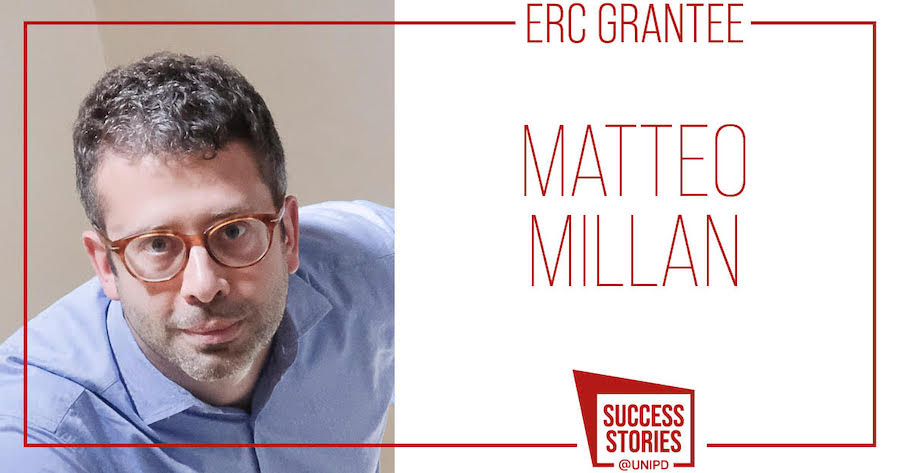
ERC Grantee: Matteo Millan
Working with a research group, promoting the knowledge and skills of each researcher to obtain a global result … these are just some of the advantages an ERC grant can give a PI!

Matteo Millan is Associate Professor of Contemporary History at the Department of Historical and Geographical Sciences and the Ancient World. He completed his Master degree in Modern and Contemporary History (2007) and his PhD in History (2011) at the University of Padua.
He conducted research on nationalist-populist armed movements in pre-World War I Europe as a postdoctoral fellow at the University of Padua and as a Gerda Henkel Foundation M4Human Programme (COFUND MarieCurie Action) fellow at the University of Oxford. He also received a postdoctoral fellowship from the Irish Research Council and worked at the Centre for War Studies of the University College Dublin. His research interests focus on political violence in Europe and Italy in the first half of the 20th century: he has conducted research on the intelligence network of the Italian Resistance, the fascist squadrismo, and more recently on armed groups before the Great War and the relationship between violence and democratisation processes.
In 2015, he obtained an ERC Starting grant for the project PREWArAs (2016-2022) to carry out a broad comparative research project on the role of various forms of political violence and armed associations in various European countries in the twenty-five years leading up to the outbreak of World War I.
You won an ERC grant in 2015. When and how did you decide to apply?
I’ve always thought that writing an ERC grant was easier than to prepare for other types of funding: an ERC project is basically a “scientific” one, you must be precise and convincing in describing your research project, without thinking, for example, about the communication and dissemination part of it.
So the idea to participate in the ERC call came when I was working for a MSCA COFUND project in Oxford. At that time, I had very few expectations. I was thinking that getting an ERC was something for “research rock stars”, such as my future supervisor in Dublin: he himself had been an ERC Grantee, had a very strong CV with super-prestigious postdocs and top publications.
While writing my proposal, I remember being aware I was very far from being a “research rock star”, but I was also convinced my proposal was a very good one. So I started working on it in a very relaxed way, with few expectations and the idea to apply also a second (and maybe third!) time.
I submitted the project and literally forgot about it. When I received the notification I had the opportunity to present my project to the ERC panel in Brussels -, that is when the worries began! I had lots of doubts, I spent the whole summer preparing for the interview, I attended trainings…and at the end it went very well, the panel showed much interest and raised so many questions, I was convinced my project had a chance to win…and so it was!
Can you tell us something about your ERC project? Which are the strengths of your project, what do you think gave you the chance to win?
PREWArAs - The Dark side of the Belle Epoque. Political Violence and Armed Associations in Europe before the First World War – is a comparative historical study which examines the role played by militias, paramilitary movements, armed organisations, and vigilante groups before the First World War (from the late 19th century to 1914).
We are taking into account two main kinds of armed associations, with a European dimension and with some insights also from the experiences of the colonies: on one hand we investigate the associations that are involved in labour and social conflicts, activated alongside or against traditional police forces. Examples include strikebreaking groups, private or auxiliary police, civic militias and so on so forth. On the other hand, we consider associations linked to the world of war, from shooting associations to actual paramilitary groups to youth armed groups
These two large groups have never been studied systematically, neither at the European level nor as part of the same phenomenon: this is the great novelty of my project. The project argues that all these groups were a response to powerful processes of democratization which were unleashing rapid and deep political, institutional, social and economic changes across Europe.
You work with a heterogeneous group, your team have different nationalities and research backgrounds. What is it like to become a PI of a research project like yours?
I’m very happy to work with a group of people who come from different European countries. We managed to get a global and transnational version of the project, bringing together different skills.
This gave us the opportunity to unify and mix multiple information, that would have been impossible for a single researcher to obtain, due to the different language skills that are required and the huge amount of topics.
In the Humanities, usually a researcher works alone, and nobody teaches you how to turn from a post-doc into a PI leading a research group. After five years, I can say I’m very satisfied, because we managed to find a balance between the autonomy and independence of each researcher and the objective of carrying out an ERC project as a whole, achieving a final and complex result.
Which advice would you give to a researcher who is thinking of applying for an ERC (starting grant)?
One of the most important things for an ERC candidate is to demonstrate that, as a researcher, you are able to both get different types of funding and to move: mobility gives you a great opportunity to increase your knowledge and create a network. To publish articles on important international journals also clearly makes a difference in your cv. All this contributes to showing that you have potential to be a reliable and responsible PI.
At the same time, the project must be ambitious enough to justify the ERC funding: researchers should get out of their comfort zone and, thinking about my area of research, the proposal should have an impact on historiography.
Ultimately, the most important question you should ask yourself as an ERC candidate is why should the European Commission give you a 1,5 million budget for your research? In my field, you must demonstrate that with your project you’re changing the way in which history is being studied and that your research has the potential to change an historical paradigm.
International Research Office
via Martiri della libertà 8, 35137 Padova, Italy
tel. +39 049.827 1947 / 1948 / 1945
fax +39 049.827 1911
international.research@unipd.it


